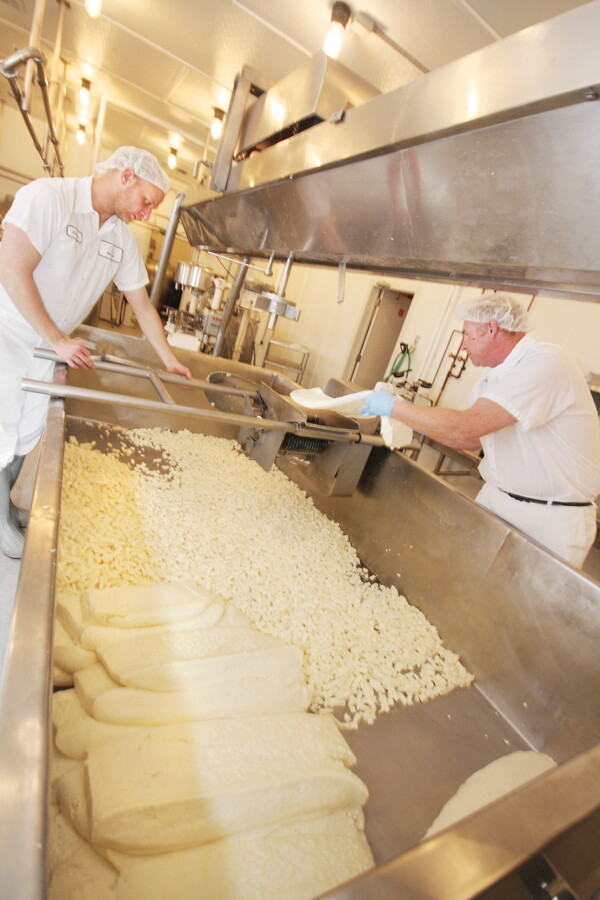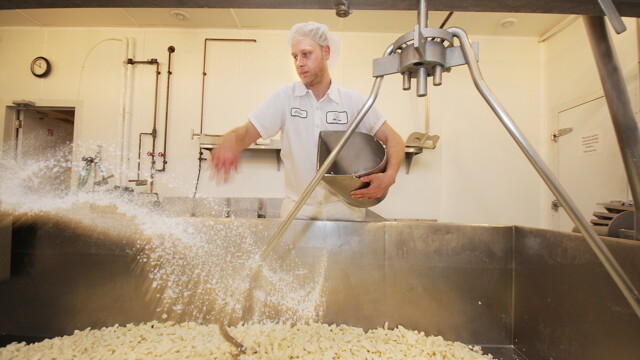Castle Rock Organic Farms
farm operation outside Osseo keeps it organic
Katie Venit, photos by Andrea Paulseth |

CURD? Castle Rock Organic Farms’s
cheesemakers use 150 milking cows to
produce 20,000 to 25,000 pounds of dairy
products each week.
It’s all part of Castle Rock’s philosophy, to remove barriers between consumers and their food. “We’re open for tours because everyone wants to see where their food comes from,” said Jake Kostka, plant manager. I visited early on a Wednesday morning – sadly, not a cheese curd day, but Jake happily showed me the beginnings of what would be blue cheese. Molds waited by a giant tub of milk, while another machine was hard at work separating out cream. Jake’s day typically starts very early, and he had already been up for hours by the time I met him at 7am.
Castle Rock’s own 800-acre dairy farm, about eight miles away from the plant, supplies all the milk they use. About 150 milking cows produce 20,000 to 25,000 pounds of dairy products each week. These very happy cows have the relaxing living conditions, beautiful pastures, and high-quality feed that a smaller dairy can give them. (Take that, California.)
Castle Rock has only been open for business for five years, although the process to become certified organic began five years before that. It seems like a lot of effort, but Jake says it’s worthwhile. He explains that the flavor of milk comes from what you put into the cows, and his customers appreciate the flavor of the milk and the ability to purchase what he calls “real food,” made without antibiotics and preservatives. As a bonus, they’ve found that the process of organically enriching their soil actually produces a better crop yield than they would have conventionally.

As you would expect, the milk is treated with just as much care and respect as the cows are. Unlike large dairies, Castle Rock doesn’t use ultra pasteurization (heating the milk to at least 280 degrees for two seconds), which opponents say destroys a lot of the flavor of the milk. Instead, Castle Rock employs the gentler vat pasteurization method, which heats the milk at 145 degrees for 30 minutes and tends to appeal to people looking for a healthier product. Castle Rock also skips the homogenization process, which spins milk very quickly to break fat molecules into tiny particles that are difficult to digest.
I asked what he thought of the raw milk movement. From a business standpoint, he wasn’t sure it would take off even if it were legal due to low demand. However, raw milk cheese, which has been aged for at least 60 days, is perfectly legal and is one of their best-selling cheeses. Also very popular at Castle Rock are the chocolate milk and the molasses chocolate chip ice cream, which sounded amazing to me even at seven o’clock in the morning.
Castle Rock’s products can be found in Festival Foods, Gordy’s, Weaver’s, and the Eau Claire Farmers Market, in addition to retailers as far away as Green Bay and Chicago. They also service 150 home delivery customers, some as far north as Bloomer. In addition to dairy products, Castle Rock sells beef, pork, chicken, and eggs (all except the chicken come from their own farms). Although these proteins are raised organically, they are not certified because Castle Rock sells these products direct to the consumers.
Castle Rock Organic Farms • S13240 Young Road, Osseo • 597-0085 • CastleRockFarms.net




















